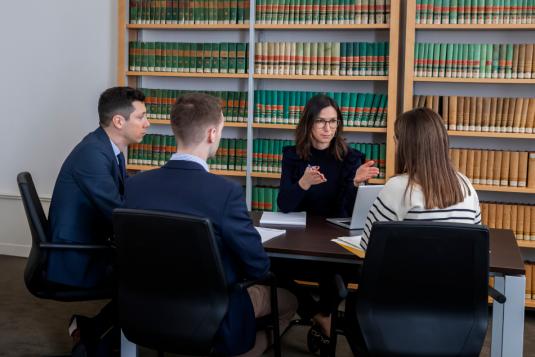Mediation is a voluntary, non-binding and confidential process. It can be initiated at any time. Ideally, it is initiated before the case is referred to the courts. However, it can also take place during legal proceedings.
The framework of the mediation is adapted to each case, in consultation between the mediator and the participants. It serves as a basis for discussion throughout the mediation.
- The mediator guarantees the proper conduct of the mediation.
- He/she ensures that everyone's speaking time is respected and that there is a good understanding between the participants.
- He/she facilitates communication and invites the protagonists to express their respective points of view in order to highlight the real causes of the conflict. In this context, the participants will seek and find together, with the help of the mediator, tailor-made, original and forward-looking solutions that will put a definitive end to all their disputes.
Mediation is different from conciliation and negotiation.
Conciliation
Conciliation is the judicial form of amicable dispute resolution. Unlike the mediator, the judicial authority is not chosen by the parties.
The purpose of the conciliation hearing is to allow the parties, thanks to the intervention of the third party conciliator, in a confidential and informal setting, to find an amicable solution to their dispute.
The judicial conciliation has the following characteristics:
- Depending on the nature of the dispute, especially in civil proceedings, the conciliation attempt is mandatory. Most of the time, it is free of charge or not very expensive (no judicial fees), except for the lawyer's fees, which the parties have to pay unless legal aid is granted.
- Depending on the nature of the dispute, the conciliation attempt may be conducted by a magistrate or a specialized collegial judicial authority (for example, in matters of leases and rents). In other cases, for example in family disputes (divorce), it is entrusted to the judge called upon to settle the dispute, if the attempt fails.
- Based on an initial legal analysis of the facts, the judicial authority can informally give its opinion on the foreseeable outcome of the dispute and/or propose solutions that the parties are free to accept.
- The conciliation primarily deals with the positions of the parties and their mutual claims as they appear in the submissions made in the court proceedings. It usually takes place at the beginning of the proceedings. However, it can be attempted at any time during the proceedings.
- The conciliator can also lead the parties to find broader solutions or solutions more adapted to the interests of each party by integrating into the discussions issues not included in the subject of the dispute.
- In certain specific cases, the conciliator sometimes has the power to render decisions or issue proposals of judgment.
- In the event of an agreement, total or partial, it leads to a transaction formalized by the judicial authority, which is equivalent to a judgment.
- If the attempt at conciliation fails at the beginning of the proceedings, the applicant(s) will be granted permission to bring their action before the authority of first instance.


